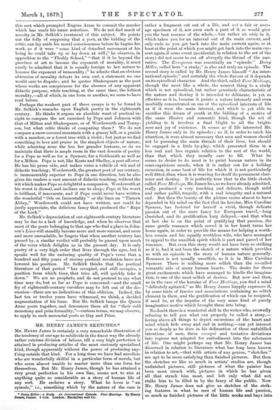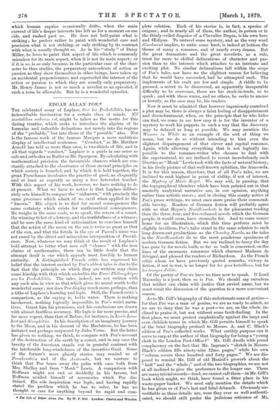MR. HENRY JAMES'S SKETCHES.*
MR. HENRY JAMES is certainly a very remarkable illustration of the tendency of our age to subdivide in the finest way the already rather extreme division of labour, till a very high perfection is attained in producing articles of the most curiously specialised kind, though apparently without the power of producing any- thing outside that kind. For a long time we have had novelists who are wonderfully skilful in a particular form of novels, but who seem almost unable to master more than one form for themselves. But Mr. Henry James, though he has attained a very great perfection in his own line, seems not to aim at anything quite so considerable as a story of human life of any sort. He eschews a story. What he loves is "an episode," i.e., something which by the nature of the case is • Dais:11711er: a 'Study. An International Episode. Four Meetings. By Henry James, Junior. 2 vols. London; Macmillan and Co. rather a fragment cut out of a life, and not a fair or aver- age specimen of it, nor even such a part of it as would give you the best essence of the whole,—but rather an eddy in it, which takes you for an interval out of its main current, and only ends as you get back into the main current again, or at least at the point at which you might get back into the main cur- rent again,if some event (accidental, in relation to the art of the story) did not occur to cut off abruptly the thread of the nar- rative. The Europeans was essentially an "episode." Daisy Miller, called here "a study," is also and truly an episode. The second story is called by Mr. Henry James himself "An inter- national episode," and certainly the whole flavour of it depends on its episodical character. And the third, called Four Meetings, though the most like a whole, the nearest thing to a study which is not episodical, but rather genuinely characteristic of the nature and destiny it is intended to delineate, is yet so effective as it is, because it paints a nature intensely and even morbidly concentrated on one of the episodical interests of life as if it were the main interest, and which is yet able to sacrifice this dream of youth at the bidding of a motive of the same illusive and romantic kind, though the act of yielding to it involves a final blight to all the bright- ness and joy of existence. It seems as if life interested Mr. Henry James only in its episodes ; as if, in order to catch his attention, it were almost necessary that men and women should not be pursuing the main threads of their lives, but should be engaged in a little by-play, which presented them in a less real and less organic relation to the rest of the world, than that which they usually care to fill. What he seems to desire to do most is to paint human nature in its semi-capricious moods, when it is rather out for a holiday excursion, in some beat of life for which it is not particularly well fitted, than when it is weaving for itself its permanent char- acter and destiny. It is perfectly true that in the little sketch called Four Meetings, Mr. James has, as we have already admitted, really produced a very touching and delicate, though mild and rather pallid, tragedy, with a real integrity and a natural end. But then the beauty of the picture seems almost to have depended in his mind on the fact that its heroine, Miss Caroline Spencer, has fostered for herself a vivid, though delicate passion out of the mere fancy for European travel,—long cherished, and its gratification long delayed,—and that when at last she is on the point of gratifying that passion, the same gentle romance which sowed it in her heart turns her home again, in order to provide the means for helping a worth- less cousin and his equally worthless wife, who have managed to appeal to the unselfish spirit which is part and parcel of her romance. But even this story would not have been so striking as it is, had it not been the sketch of a nature which provides us with an episode in the story of human nature generally. Romance is not usually unselfish, as it is in Miss Caroline Spencer. There is nothing more selfish than the so-called romantic side of many human hearts. The desire for those great excitements which have managed to kindle the imagina- tion, is one of the most selfish of desires. But now and then, as in the case of the heroine of Four Meetings, you find a mind "delicately agitated," as Mr. Henry James happily expresses it, by some train of fancies and associations containing no selfish element in them, and the gratification of which can be resigned, if need be, at the impulse of the very same kind of purely imaginative motive which brought them into being.
No doubt there is a wonderful skill in the writer who, avowedly refusing to tell you what can properly be called a story,— loving above all things to depict excursions of the heart and mind which fade away and end in nothing,—can yet interest you so deeply as he does in his delineation of these unfulfilled intentions of men, these mangue and tentative deviations into regions not adapted for embodiment into the substance of life. One might perhaps say that Mr. Henry James has discerned in relation to literature what has long been known in relation to art,—that with artists of any genius, " sketches " are apt to be more satisfying than finished pictures. But then the sketches we like so much in artists' studios are, though unfinished pictures, still pictures of what the painter has been most struck with, pictures in which he has given all that struck him moot, and left only what did not stKike him to be filled in by the fancy of the public. Now Mr. Henry James does not give us sketches of the strik- ing features in what he sees of human life and passion, so much as finished pictures of the little nooks and bays into
which human caprice occasionally drifts, when the main current of life's deeper interests has left us for a moment on one side, and rushed past us. He does not half-paint what is striking ; he prefers rather to paint with wonderful care and precision what is not strkiing, or only striking by its contrast with what is usually thought so. As in his " study " of Daisy Miller, he loves to paint that aspect of life which is commonly mistaken for its main aspect, when it is not its main aspect ; or if it is so, is so only because, in the particular case of the char- acter he thus studies, the preparatory antecedents of action or passion as they show themselves in other beings, have taken up an accidental preponderance, and superseded the interest of the action or passion to which they are usually only preparatory. Mr. Henry James is not so much a novelist as an episodist, if such a term be allowable. But he is a wonderful episodist.



































 Previous page
Previous page